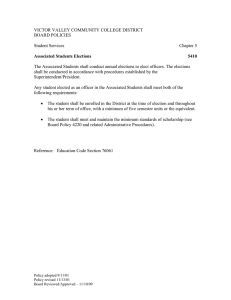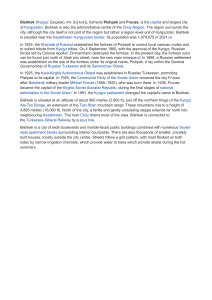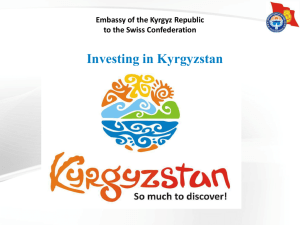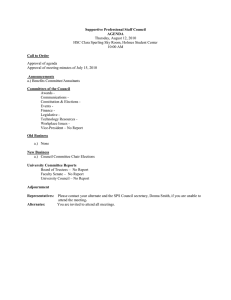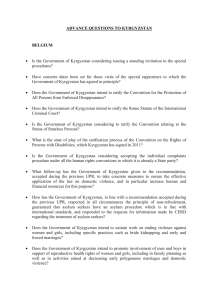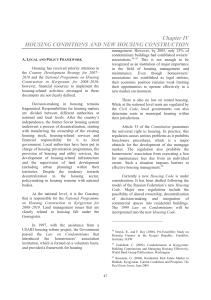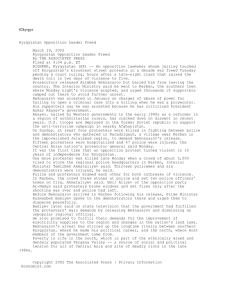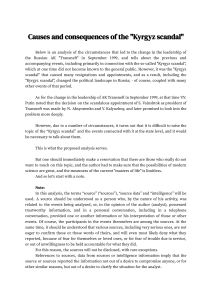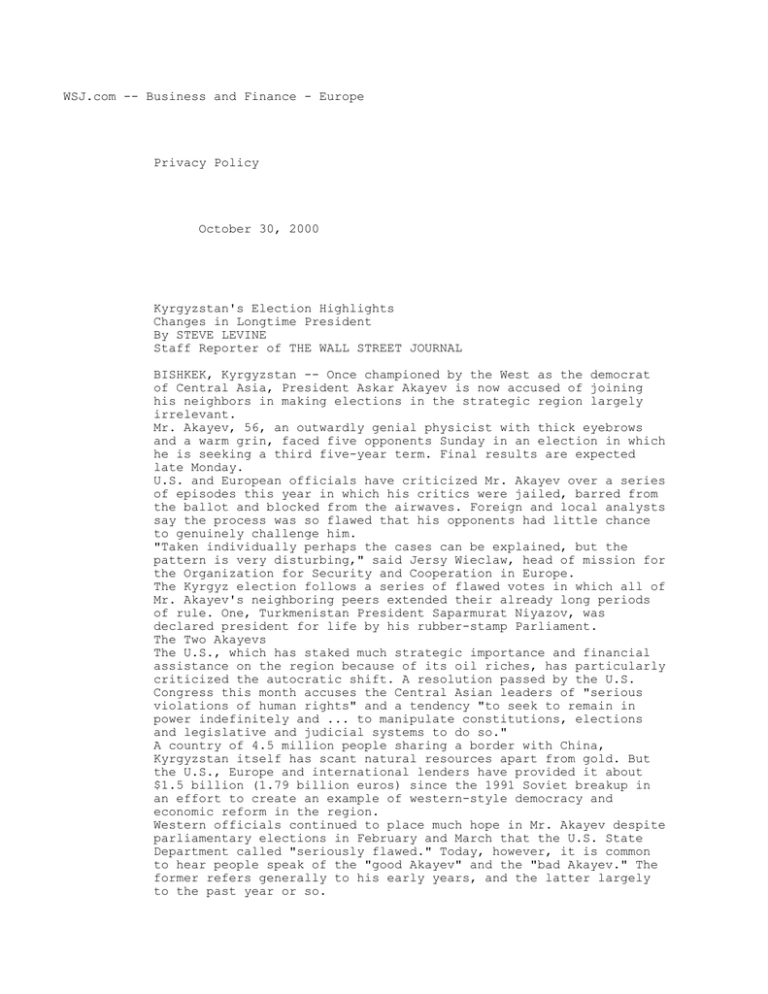
WSJ.com -- Business and Finance - Europe
Privacy Policy
October 30, 2000
Kyrgyzstan's Election Highlights
Changes in Longtime President
By STEVE LEVINE
Staff Reporter of THE WALL STREET JOURNAL
BISHKEK, Kyrgyzstan -- Once championed by the West as the democrat
of Central Asia, President Askar Akayev is now accused of joining
his neighbors in making elections in the strategic region largely
irrelevant.
Mr. Akayev, 56, an outwardly genial physicist with thick eyebrows
and a warm grin, faced five opponents Sunday in an election in which
he is seeking a third five-year term. Final results are expected
late Monday.
U.S. and European officials have criticized Mr. Akayev over a series
of episodes this year in which his critics were jailed, barred from
the ballot and blocked from the airwaves. Foreign and local analysts
say the process was so flawed that his opponents had little chance
to genuinely challenge him.
"Taken individually perhaps the cases can be explained, but the
pattern is very disturbing," said Jersy Wieclaw, head of mission for
the Organization for Security and Cooperation in Europe.
The Kyrgyz election follows a series of flawed votes in which all of
Mr. Akayev's neighboring peers extended their already long periods
of rule. One, Turkmenistan President Saparmurat Niyazov, was
declared president for life by his rubber-stamp Parliament.
The Two Akayevs
The U.S., which has staked much strategic importance and financial
assistance on the region because of its oil riches, has particularly
criticized the autocratic shift. A resolution passed by the U.S.
Congress this month accuses the Central Asian leaders of "serious
violations of human rights" and a tendency "to seek to remain in
power indefinitely and ... to manipulate constitutions, elections
and legislative and judicial systems to do so."
A country of 4.5 million people sharing a border with China,
Kyrgyzstan itself has scant natural resources apart from gold. But
the U.S., Europe and international lenders have provided it about
$1.5 billion (1.79 billion euros) since the 1991 Soviet breakup in
an effort to create an example of western-style democracy and
economic reform in the region.
Western officials continued to place much hope in Mr. Akayev despite
parliamentary elections in February and March that the U.S. State
Department called "seriously flawed." Today, however, it is common
to hear people speak of the "good Akayev" and the "bad Akayev." The
former refers generally to his early years, and the latter largely
to the past year or so.
Presidential spokesman Osmonokum Ibrahimov denied that there was a
bad Mr. Akayev. He said the criticism was a reflection of local
"psychological exhaustion" after the republic's economic
difficulties of the last decade. In fact, Mr. Ibrahimov said,
Kyrgyzstan has avoided the human-rights violations and wars its
neighbors have suffered because of Mr. Akayev's "gentle hands, his
gentle voice and his gentle manner."
"Akayev is the same, but people have changed," Mr. Ibrahimov said.
"The focus of the people has changed."
Silencing Rivals
Foreign officials and local critics agree that Mr. Akayev is more
tolerant than his neighbors. But they still accuse his
administration of ordering judges and other officials to exclude
some opponents from the parliamentary and presidential elections.
Two court cases have attracted particular attention. In one, a judge
last month sentenced Topchubek Turgunaliev, 58, the former rector of
a Bishkek university and one of Mr. Akayev's most vocal critics, to
16 years in prison for allegedly plotting to assassinate him. Mr.
Turgunaliev was an ally of Mr. Akayev's in the early 1990s, and this
is the third time he has been sentenced to prison since turning
against the president. In 1996 he received an 18-month suspended
sentence for insulting Mr. Akayev, and in 1997 he was sentenced to
four years in prison for alleged embezzlement. One diplomat who
studied the latest case said the evidence appeared thin and that
"the sentence sends a terrifying message to any opponent."
In the second case, Feliks Kulov, Mr. Akayev's most serious
political opponent, is being tried for a second time in secret
proceedings on charges of abusing his power when he headed the local
successor agency to the KGB. Mr. Kulov, 52, was acquitted of the
charge in August, and international human-rights groups have accused
the government of subjecting him to double jeopardy.
A dapper man with cropped silver hair, Mr. Kulov had announced plans
to oppose Mr. Akayev for president, Ultimately, he refused to take a
much-criticized but required examination in the Kyrgyz language.
Instead Mr. Kulov ran on the ticket of presidential candidate
Omurbek Tekebayev. Mr. Kulov would be prime minister if Mr.
Tekebayev were to win.
"He is an autocrat," Mr. Kulov said of Mr. Akayev. "He took all the
power. But he answers for nothing he does."
Write to Steve LeVine at steve.levine@wsj.com
Use the Euro Currency Converter to calculate the value of the 11
euro-zone currencies versus the euro.
Return to top of page | Format for printing
Copyright © 2000 Dow Jones & Company, Inc. All Rights Reserved.
Copyright and reprint information.
2

